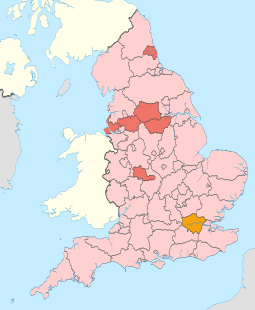Metropolitan and non-metropolitan counties of England
| Metropolitan and non-metropolitan county | |
|---|---|
 |
|
| Category | Administrative counties |
| Location | England |
| Found in | Region |
| Created by | Local Government Act 1972 |
| Created | 1974 |
| Number | 83 (as of 1 April 2009) |
| Possible types |
Metropolitan (6) Non-metropolitan (77) |
| Possible status | Multiple districts with no county council (6 metropolitan counties and 1 non-metropolitan county) Multiple districts with county council (27 non-metropolitan counties) Single district with unitary authority (49 non-metropolitan counties) |
| Subdivisions | 36 metropolitan districts 256 non-metropolitan districts |
Metropolitan and non-metropolitan counties are one of the four levels of subdivisions of England used for the purposes of local government outside Greater London and the Isles of Scilly. As originally constituted, the metropolitan and non-metropolitan counties each consisted of multiple districts, had a county council and were also the counties for the purposes of Lieutenancies. Later changes in legislation during the 1980s and 1990s have allowed counties without county councils and 'unitary authority' counties of a single district. Counties for the purposes of Lieutenancies are now defined separately, based on the metropolitan and non-metropolitan counties.
In 2009, there were further structural changes in some areas, resulting in a total of 83 metropolitan and non-metropolitan counties. These 83 counties collectively consist of 292 districts or district-level subdivisions, i.e. 36 metropolitan boroughs and 256 non-metropolitan districts (201 of these are subdivisions of non-metropolitan counties with county councils; 6 are subdivisions (and also unitary authorities, but without non-metropolitan county status) of Berkshire, which is a non-metropolitan county with no county council; and the remaining 49 are unitary authorities that have non-metropolitan county status).
The metropolitan counties are Greater Manchester, Merseyside, South Yorkshire, Tyne and Wear, West Midlands and West Yorkshire. The counties typically have populations of 1.2 to 2.8 million.
The county councils of these were abolished in 1986, but the counties themselves still exist legally. They are used for some administrative and geographic purposes, and are still ceremonial counties. Most of the powers that the former county councils had were devolved to their metropolitan boroughs, which are now in effect unitary authorities; however, some functions (such as emergency services, civil defence and public transport) are still run jointly on a metropolitan-county-wide basis.
...
Wikipedia
